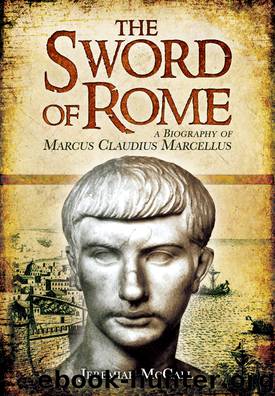The Sword of Rome: A Biography of Marcus Claudius Marcellus by Jeremiah McCall

Author:Jeremiah McCall [McCall, Jeremiah]
Language: eng
Format: azw3, epub
Tags: Ancient, Political, General, Rome, Historical, Biography & Autobiography, Military, History
ISBN: 9781848843790
Google: g3pGLwEACAAJ
Publisher: Pen & Sword Military
Published: 2012-10-14T18:30:00+00:00
Chapter 4
The Political Battle for Syracuse
Late in 211 or early in 210, Marcellus returned from Sicily. He left his troops there under his successor, though apparently unwillingly, since he hoped to bring them home at least in part to serve as witnesses to his deeds.1 The timing of his return to Italy can only mean he intended to seek the consulship; otherwise, his command would not have expired until the new consuls were inaugurated sometime in March of 210. Clearly, Marcellus also intended to claim a triumph for his victory over Syracuse. Accordingly, he did not enter the city in observance of an important religious restriction. According to Roman custom, a proconsul, one who held the military powers of a consul by special appointment of the senate, no longer retained his imperium once he crossed the pomerium, the sacred boundary of the city. Once lapsed, the proconsul’s term of command was formally over. Since the army marched along with the general in a triumph, the celebration was technically an exercise of command, and thus it was necessary for the commander to retain imperium up to the day of the triumph. Then a vote of the assembly was secured so that, for the day and purposes of the triumph, the commander could hold imperium within the pomerium. Thus a commander seeking a triumph, in practice, would wait outside the city walls until he could be granted the victory celebration by the senate and an exemption to the normal loss of imperium by the people.2 And so, Marcellus waited until the senate could approve his request. The praetor Gaius Calpurnius facilitated the process by summoning a meeting of the senate at the Temple of Bellona, outside the pomerium on the outskirts of the city.3
Though the capture of a city as great as Syracuse may have made a triumph seem like a foregone conclusion, Marcellus may have thought he needed to mount a special argument. In part, this may have been because his soldiers had remained in Syracuse at the command of the senate. Ordinarily, a general’s soldiers were the critical witnesses of his deeds and to that extent were important in approving his victory celebration. Livy illustrates this most powerfully in an episode from more than forty years after Marcellus took Syracuse. A military tribune, Servius Servilius Galba, had a grievance against Aemilius Paulus, the commander who spectacularly defeated King Perseus and reduced Macedonia to a subject state. Galba endeavored to block Paulus’ triumph by inciting the commander’s soldiers to vote against granting him a triumph. Many of the soldiers appear to have been more than willing, resenting the fact that Paulus had not given them greater shares of the Macedonian loot. According to Livy, Galba noted that the plebeian assembly would surely follow the lead of the army and refuse to grant honours to Paulus if his own soldiers would not.4 Though it is far from clear that hesitant soldiers could always block the triumph of a general in such a
Download
The Sword of Rome: A Biography of Marcus Claudius Marcellus by Jeremiah McCall.epub
This site does not store any files on its server. We only index and link to content provided by other sites. Please contact the content providers to delete copyright contents if any and email us, we'll remove relevant links or contents immediately.
| France | Germany |
| Great Britain | Greece |
| Italy | Rome |
| Russia | Spain & Portugal |
Fanny Burney by Claire Harman(26591)
Empire of the Sikhs by Patwant Singh(23066)
Out of India by Michael Foss(16841)
Leonardo da Vinci by Walter Isaacson(13304)
Small Great Things by Jodi Picoult(7112)
The Six Wives Of Henry VIII (WOMEN IN HISTORY) by Fraser Antonia(5493)
The Wind in My Hair by Masih Alinejad(5085)
A Higher Loyalty: Truth, Lies, and Leadership by James Comey(4945)
The Crown by Robert Lacey(4801)
The Lonely City by Olivia Laing(4796)
Millionaire: The Philanderer, Gambler, and Duelist Who Invented Modern Finance by Janet Gleeson(4457)
The Iron Duke by The Iron Duke(4345)
Papillon (English) by Henri Charrière(4251)
Sticky Fingers by Joe Hagan(4183)
Joan of Arc by Mary Gordon(4091)
Alive: The Story of the Andes Survivors by Piers Paul Read(4017)
Stalin by Stephen Kotkin(3953)
Aleister Crowley: The Biography by Tobias Churton(3626)
Ants Among Elephants by Sujatha Gidla(3458)
